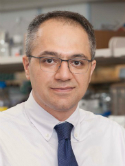Ultra-deep next-generation sequencing of plasma cell-free DNA in patients with advanced lung cancers: Results from the Actionable Genome Consortium Journal Article
| Authors: | Li, B. T.; Janku, F.; Jung, B.; Hou, C.; Madwani, K.; Alden, R.; Razavi, P.; Reis-Filho, J. S.; Shen, R.; Isbell, J. M.; Blocker, A. W.; Eattock, N.; Gnerre, S.; Satya, R. V.; Xu, H.; Zhao, C.; Hall, M. P.; Hu, Y.; Sehnert, A. J.; Brown, D.; Ladanyi, M.; Rudin, C. M.; Hunkapiller, N.; Feeney, N.; Mills, G. B.; Paweletz, C. P.; Janne, P. A.; Solit, D. B.; Riely, G. J.; Aravanis, A.; Oxnard, G. R. |
| Article Title: | Ultra-deep next-generation sequencing of plasma cell-free DNA in patients with advanced lung cancers: Results from the Actionable Genome Consortium |
| Abstract: | Background: Noninvasive genotyping using plasma cell-free DNA (cfDNA) has the potential to obviate the need for some invasive biopsies in cancer patients while also elucidating disease heterogeneity. We sought to develop an ultra-deep plasma next-generation sequencing (NGS) assay for patients with non-small-cell lung cancers (NSCLC) that could detect targetable oncogenic drivers and resistance mutations in patients where tissue biopsy failed to identify an actionable alteration. Patients and methods: Plasma was prospectively collected from patients with advanced, progressive NSCLC. We carried out ultra-deep NGS using cfDNA extracted from plasma and matched white blood cells using a hybrid capture panel covering 37 lung cancer-related genes sequenced to 50 000x raw target coverage filtering somatic mutations attributable to clonal hematopoiesis. Clinical sensitivity and specificity for plasma detection of known oncogenic drivers were calculated and compared with tissue genotyping results. Orthogonal ddPCR validation was carried out in a subset of cases. Results: In 127 assessable patients, plasma NGS detected driver mutations with variant allele fractions ranging from 0.14% to 52%. Plasma ddPCR for EGFR or KRAS mutations revealed findings nearly identical to those of plasma NGS in 21 of 22 patients, with high concordance of variant allele fraction (r = 0.98). Blinded to tissue genotype, plasma NGS sensitivity for de novo plasma detection of known oncogenic drivers was 75% (68/91). Specificity of plasma NGS in those who were driver-negative by tissue NGS was 100% (19/19). In 17 patients with tumor tissue deemed insufficient for genotyping, plasma NGS identified four KRAS mutations. In 23 EGFR mutant cases with acquired resistance to targeted therapy, plasma NGS detected potential resistance mechanisms, including EGFR T790M and C797S mutations and ERBB2 amplification. Conclusions: Ultra-deep plasma NGS with clonal hematopoiesis filtering resulted in de novo detection of targetable oncogenic drivers and resistance mechanisms in patients with NSCLC, including when tissue biopsy was inadequate for genotyping. |
| Keywords: | lung cancer; egfr; kras; validation; resistance; mutations; oncogenic; next-generation sequencing; driver; drivers; plasma cell-free dna |
| Journal Title: | Annals of Oncology |
| Volume: | 30 |
| Issue: | 4 |
| ISSN: | 0923-7534 |
| Publisher: | Oxford University Press |
| Date Published: | 2019-04-01 |
| Start Page: | 597 |
| End Page: | 603 |
| Language: | English |
| ACCESSION: | WOS:000468283900016 |
| DOI: | 10.1093/annonc/mdz046 |
| PROVIDER: | wos |
| PMCID: | PMC6503621 |
| PUBMED: | 30891595 |
| Notes: | Source: Wos |
Altmetric
Citation Impact
BMJ Impact Analytics
MSK Authors
Related MSK Work













